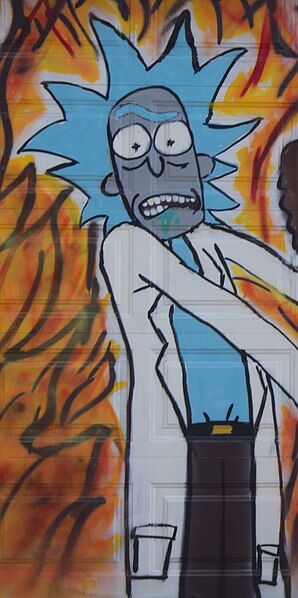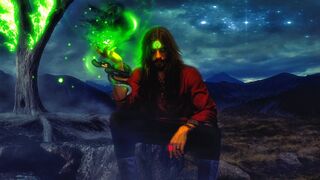Dark Triad
Why Do Antiheroes Appeal to People With Dark Traits?
Affinity for morally ambiguous characters is related to 'dark triad' traits.
Posted December 20, 2020 Reviewed by Matt Huston
Antiheroes, morally ambiguous characters who are not clearly either good or evil, are popular protagonists in modern media. A recent study found that people who have a particular affinity for antiheroes tend to be relatively high in antisocial traits, particularly aggression, Machiavellianism, and psychopathy. This suggests that people may particularly enjoy characters who they perceive as being similar to themselves. This is in line with other research that has found that people’s media preferences generally tend to reflect their personality traits, and that people’s fantasy lives are more likely to reflect their actual personalities rather than being explorations of what it would be like to be a completely different person.

A number of highly popular shows and movies have featured morally ambiguous characters as their protagonists, such as Dexter Morgan in Dexter, Walter White in Breaking Bad, and Deadpool in the movies and comics of the same name. A salient feature of such characters is ruthlessness and willingness to use violent and aggressive means to meet their goals and overcome obstacles. A number of studies have pointed out that such characters seem to possess personality traits that have been referred to as the “dark triad,” namely, narcissism, Machiavellianism, and psychopathy (Jonason et al., 2010, 2012). I have discussed the dark triad in detail in many other posts, but to recap briefly, these traits share a common core of selfish and antagonistic attitudes and behavior. Psychopathy encompasses callous disregard for the rights of others, Machiavellianism involves a cynical, manipulative approach to social interaction, and narcissism refers to a grandiose sense of one’s own superiority to others. One theory concerning these dark traits is that they evolved as a social strategy to facilitate extracting resources from other people at as little cost to oneself as possible, e.g., through intimidation and manipulation (Book & Quinsey, 2004; Jonason et al., 2009).
Considering previous research that aggressive people are more likely to view violent content, a recent study considered whether people may be more likely to have an affinity for antihero characters in media if they are high in aggressive and antisocial traits themselves, such as the dark triad (Greenwood et al., 2020). To test this, a survey asked people about how often they watched antihero narratives, how much they enjoyed them, how much they enjoyed it when antiheroes acted out of revenge or personal gain, and how much they enjoyed it when they acted for the sake of revolution or helping society.
Participants were told that an antihero is a morally ambiguous protagonist whose actions and/or motives are neither entirely heroic nor entirely villainous. They were also asked to identify a favorite antihero character or, if they could not think of a favorite, to identify an antihero with whom they were familiar. They were then asked how similar they felt they themselves were to their nominated character, how much they wanted to be like them, and about their “parasocial interaction” with the character, that is, feeling like the character was a friend that they wish they could meet in person. Furthermore, they were assessed on antisocial traits, including the dark triad, and general aggressiveness.
In their results, they found that more frequent viewing of antihero narratives was most strongly associated with general aggression. Overall enjoyment of these narratives or enjoyment of helping motivations in antihero stories was not particularly related to any of the antisocial traits, but enjoyment of antiheroes motivated by revenge or personal gain was significantly associated with Machiavellianism and aggression. Furthermore, perceived similarity to an antihero was significantly associated with aggression and psychopathy. Wishful identification was not particularly related to any of the antisocial traits, while parasocial interaction was significantly associated with Machiavellianism only. Interestingly, although male participants scored higher on antisocial traits than females, there were no particular sex differences in any of the other results.
To summarize, affinity for antiheroes was most strongly related to aggression, Machiavellianism, and psychopathy, while narcissism seemed to be much less important. This is interesting considering that Machiavellianism and psychopathy have been described as being the “darkest” members of the dark triad, as narcissists tend to enjoy at least short-term popularity and have high self-esteem. Hence, affiliation with antiheroes tends to be associated with the very darkest traits.
The findings of this study are in line with previous studies that have found that people’s media preferences tend to reflect their personality traits. For example, one study found that people who prefer angry and violent movies tend to be lower in agreeableness (Nave et al., 2020). Agreeableness is related to the quality of one’s interpersonal relationships, such that people who are kind and considerate tend to be high in it, while those who are cynical, distrustful, and aggressive tend to be at the low end. Additionally, the dark triad traits are most particularly associated with low agreeableness (O’Boyle et al., 2015).
Beyond media preferences, there is evidence that people’s fantasy lives tend to reflect their personality traits. For example, one study found that people who were prone to aggressive fantasies tended to be lower in agreeableness, and were also more likely to admit to actual aggressive behavior (McCreery & Krach, 2018). Apart from pure fantasy, comparable results have been found for people’s choices in fantasy role-playing games. In a study in which people were asked to design a character of their own choosing for use in an online Dungeons and Dragons-style game, those with lower agreeableness were more likely to design evil rather than good or morally neutral characters (Ewell et al., 2016). Similarly, another study on the occupations people chose in fantasy role-playing games found that people high in agreeableness tended to prefer character classes associated with religious and prosocial roles, such as monk, paladin, cleric, or druid, while those low in agreeableness were drawn to antisocial occupations associated with death, such as assassin or necromancer.

I found this interesting because fantasy settings are unconstrained by the moral demands of the real world, so they give people an opportunity to explore what it would be like to be a vastly different person. In practice though, people may not stray too far from their actual personality inclinations even in fantasy. That is, people high in agreeableness tend to have fantasies about characters who are noble and help others, while those with darker inclinations are more willing to imagine transgressing social taboos.
As well as waking fantasy, there is evidence that the content of people’s dreams may to some extent reflect their personality traits. One study found that people high in psychopathy and Machiavellianism reported more dreams with aggressive content (Lyons et al., 2018), while another study found that people low in agreeableness and prone to aggressive behavior were more likely to report dreams about killing a person (Schredl & Mathes, 2014).
One theory proposes that fantasies act as scripts that allow a person to mentally rehearse behavioral patterns (Gilbert & Daffern, 2017). A parallel theory suggests that dreaming evolved as a platform in which to simulate behaviors that can be used to deal with common problems. From this perspective, media preferences may fulfill a similar function to fantasy, one that is not entirely detached from reality but that simulates personally relevant strivings. Fantasy and storytelling may serve to mentally simulate solving particular problems.
As I noted earlier, people with dark traits prefer a social strategy that uses aggressive and antisocial solutions to get their way. Greenwood et al. found that people with dark traits were more likely to enjoy characters motivated by revenge; similarly, revenge fantasies may be appealing to aggressive people as a mental simulation of how they would like to solve their interpersonal issues. Hence, people with dark traits might feel an affinity for antiheroes because they simulate how these people would prefer to deal with their own problems.
© Scott McGreal. Please do not reproduce without permission. Brief excerpts may be quoted as long as a link to the original article is provided.
Schredl, M., & Mathes, J. (2014). Are dreams of killing someone related to waking-life aggression? Dreaming, 24(3), 176–181. https://doi.org/10.1037/a0037213
References
Book, A. S., & Quinsey, V. L. (2004). Psychopaths: Cheaters or warrior-hawks? Personality and Individual Differences, 36(1), 33–45. https://doi.org/10.1016/S0191-8869(03)00049-7
Ewell, P. J., Guadagno, R. E., Jones, M., & Dunn, R. A. (2016). Good Person or Bad Character? Personality Predictors of Morality and Ethics in Avatar Selection for Video Game Play. Cyberpsychology, Behavior, and Social Networking, 19(7), 435–440. https://doi.org/10.1089/cyber.2015.0207
Gilbert, F., & Daffern, M. (2017). Aggressive scripts, violent fantasy and violent behavior: A conceptual clarification and review. Aggression and Violent Behavior, 36, 98–107. https://doi.org/10.1016/j.avb.2017.05.001
Greenwood, D., Ribieras, A., & Clifton, A. (2020). The dark side of antiheroes: Antisocial tendencies and affinity for morally ambiguous characters. Psychology of Popular Media, Advance online publication. https://doi.org/10.1037/ppm0000334
Jonason, P. K., Li, N. P., & Teicher, E. A. (2010). Who is James Bond?: The Dark Triad as an agentic social style. Individual Differences Research, 8(2), 111–120.
Jonason, P. K., Li, N. P., Webster, G. D., & Schmitt, D. P. (2009). The dark triad: Facilitating a short-term mating strategy in men. European Journal of Personality, 23(1), 5–18. https://doi.org/10.1002/per.698
Jonason, P. K., Webster, G. D., Schmitt, D. P., Li, N. P., & Crysel, L. (2012). The Antihero in Popular Culture: Life History Theory and the Dark Triad Personality Traits. Review of General Psychology, 16(2), 192–199. https://doi.org/10.1037/a0027914
Lyons, M., Khan, S., Sandman, N., & Valli, K. (2018). Dark Dreams Are Made of This: Aggressive and Sexual Dream Content and the Dark Triad of Personality. Imagination, Cognition and Personality, 0276236618803316. https://doi.org/10.1177/0276236618803316
McCreery, M. P., & Krach, K. S. (2018). How the human is the catalyst: Personality, aggressive fantasy, and proactive-reactive aggression among users of social media. Personality and Individual Differences, 133, 91–95. https://doi.org/10.1016/j.paid.2017.06.037
Nave, G., Rentfrow, J., & Bhatia, S. (2020). We Are What We Watch: Movie Plots Predict the Personalities of Those who “Like” Them. PsyArXiv. https://doi.org/10.31234/osf.io/wsdu8
O’Boyle, E. H., Forsyth, D. R., Banks, G. C., Story, P. A., & White, C. D. (2015). A Meta-Analytic Test of Redundancy and Relative Importance of the Dark Triad and Five-Factor Model of Personality. Journal of Personality, 83(6), 644–664. https://doi.org/10.1111/jopy.12126




